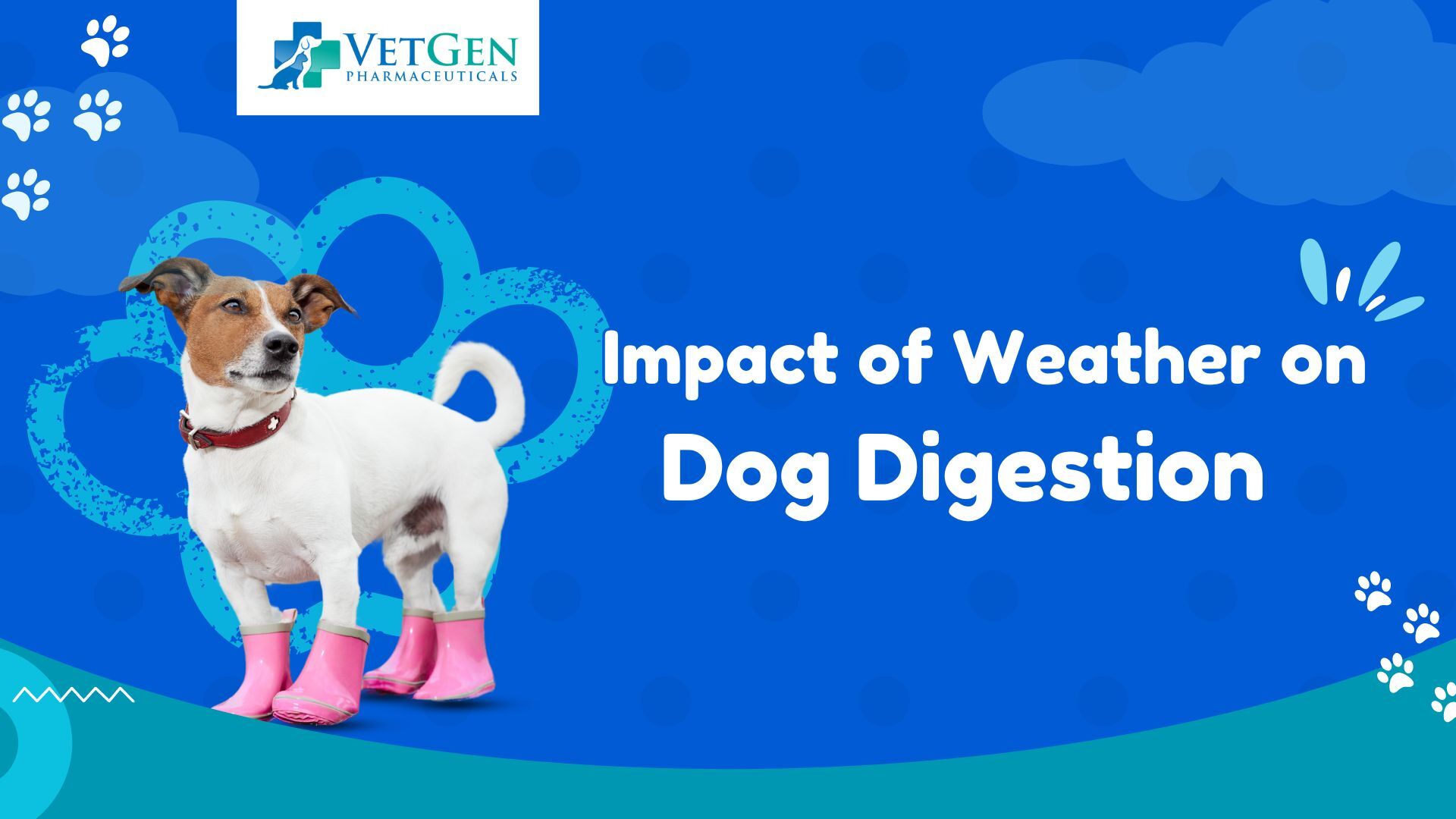Table of Contents
As a pet owner, have you ever wondered about whether weather can impact the comfort and health of your pet? Especially if it can influence your dog’s digestive system? And if yes, how does it impact your dog?
Well, in this guide we will explore how weather patterns directly impact your dog’s digestive health!
The Sensitive Canine Stomach
Weather changes can also affect a dog since they are equally important sensitive beings just like humans. Their digestive systems are in no way an exception to this rule of the body. Are dogs sensitive to weather? The answer is a definite yes!
Weather changes may cause some form of gastrointestinal discomfort in dogs, which may be mild or sometimes can even be severe.
Temperature Adaptation and Metabolism
A groundbreaking study on Inuit sled dogs, published in the Journal of Comparative Physiology B, revealed fascinating insights into canine temperature adaptation and metabolism.
The research found that these dogs have an extremely wide thermoneutral zone, extending down to -25°C. This suggests that many dogs may be more adaptable to temperature changes than we previously thought.
How Does Hot Weather Affect Your Dog’s Digestion?
Can hot weather upset a dog’s stomach? Absolutely. When temperatures rise, dogs can experience a range of digestive problems. Heat stress can lead to:
- Decreased appetite
- Nausea and vomiting
- Diarrhea
- Dehydration
According to a study published in the Journal of Veterinary Internal Medicine, heat stress in dogs can lead to increased gut permeability, which may result in digestive upset and other health issues.
Can temperature rise cause loss of appetite in dogs? Indeed, it can. As temperatures soar, dogs may experience a decrease in appetite. This is a natural response to help regulate body temperature, as digestion generates heat. A study by the University of Pennsylvania School of Veterinary Medicine found that dogs exposed to high temperatures showed a significant decrease in food intake.
To help your dog maintain proper dog digestive health during hot weather, consider the following tips:
- Provide plenty of fresh, cool water
- Offer smaller, more frequent meals
- Feed during cooler parts of the day (early morning or late evening)
- Which food is good for dogs in summer? Opt for easily digestible, moisture-rich foods
How Does Cold Weather Affect Your Dog’s Digestion?
While hot weather can suppress appetite, cold weather often has the opposite effect. Dogs may eat more in colder temperatures to maintain body heat.
The study on Inuit sled dogs found that their metabolic rate was continuously elevated during winter, not due to temperature effects or training, but likely due to the specific dynamic action (SDA) of digesting a continuous food supply. However, some dogs may experience the opposite reaction.
Is it normal for dogs to not eat in cold weather? While less common, some dogs may show a decreased appetite in cold weather. This could be due to:
- Reduced activity levels
- Changes in routine
- Seasonal affective disorder (yes, dogs can experience this too!)
See your veterinarian right away to rule out any underlying health concerns if your dog becomes noticeably less hungry in the winter.
To support your dog’s digestive health in colder months:
- Maintain a consistent feeding schedule
- Provide warm, nutrient-dense meals
- Ensure access to fresh, unfrozen water
- Consider adding digestive supplements
Weather Changes and Digestive Sensitivity
Rapid weather changes, such as sudden temperature drops or rises, can also affect your dog’s digestive system. These fluctuations can cause stress, leading to digestive upset. A study published in the Veterinary Record found that emergency veterinary visits for gastrointestinal issues in dogs increased during periods of rapid weather changes.
To help your dog’s digestive system adapt to weather changes:
- Gradually transition between indoor and outdoor temperatures
- Maintain a consistent routine
- Provide a balanced diet rich in prebiotics and probiotics
Conclusion
Weather does affect your dog’s digestion; it is a fact that cannot be debated on. Knowing these effects and taking the necessary actions will allow your furry companion to have normal digestion at any time of the year. Please always reach out to your veterinarian in scenarios where your dog has chronic gastrointestinal problems, or experiences dramatic alterations in feeding pattern.
Do not forget that the stomach plays a crucial role in maintaining the general health of the body; therefore, your pet’s digestion should always be a top priority, regardless of the season. If you closely monitor your pet and pay proper attention then you can easily make sure that your pet does not have to bear any kind of discomfort due to change in weather.
Frequently Asked Questions
1. Could my dog have digestion problems due to thunderstorms?
Indeed, thunderstorms can actually cause stress and anxiety leading to digestion problems among the dogs.
2. In what way can I know if the change in weather is causing harm to my dog's digestion?
Some of the symptoms to look out for include appetite changes, vomiting, diarrhea or lethargy levels.
3. Is it necessary that I should change my dog’s feeding regime according to the seasons?
It is not essential and many dogs may not require a change in diet depending on the season. All the information you obtained should be discussed with your vet.
4. Does humidity influence my dog’s digestion?
Dogs are very sensitive to heat and humidity: thus such weather conditions will make their digestion worse, and they may refuse eating or drinking water.
5. Can some breeds be affected with digestive problems especially when affected by the weather?
Yes, flat-faced breeds and coated breeds should be more careful on how hot it is and how that affects digestion of food.








